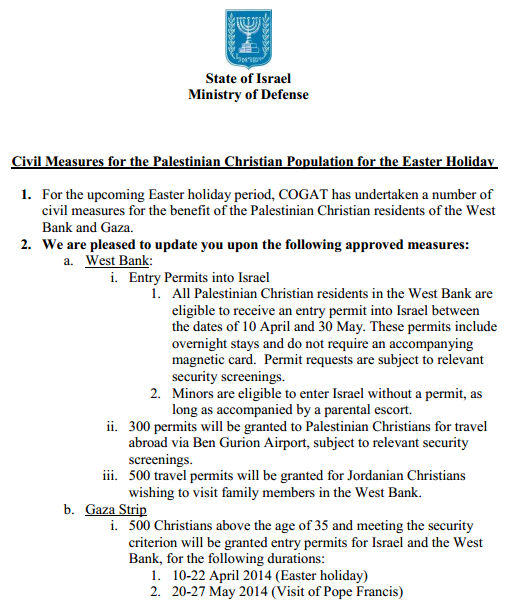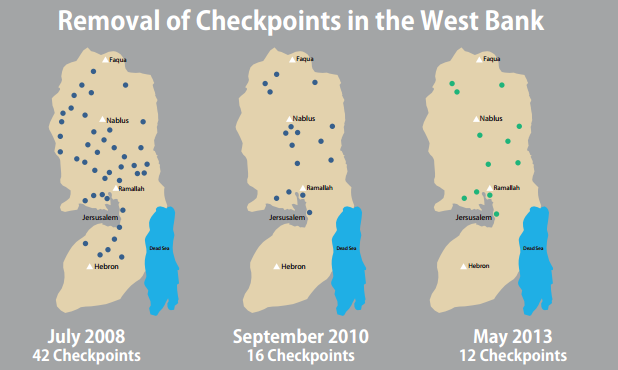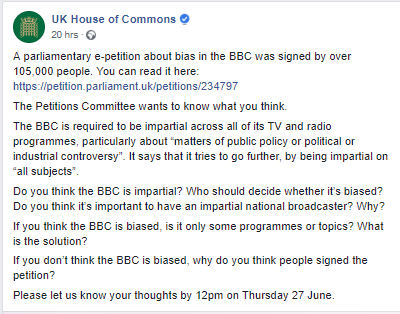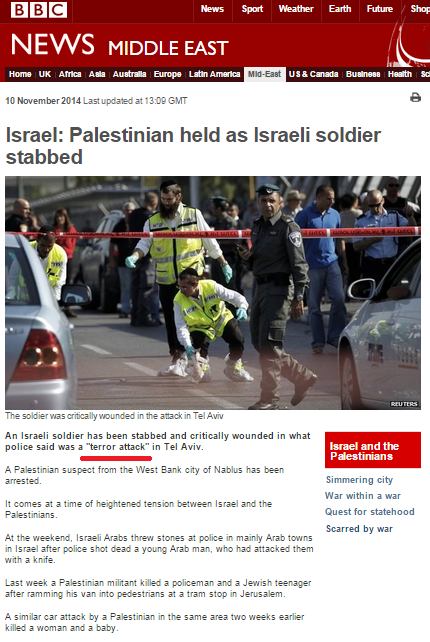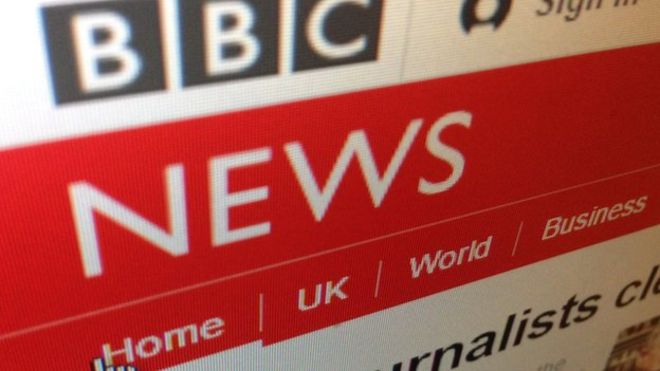h/t MA
Hot on the heels of its recent programme called “Africans in the Holy Land“, the BBC World Service has now produced a two-part programme with the similar title of “Christians in the Holy Land” as part of its ‘Heart and Soul’ series. Part one of the half-hour programme, which was initially broadcast on May 17th, can be heard here.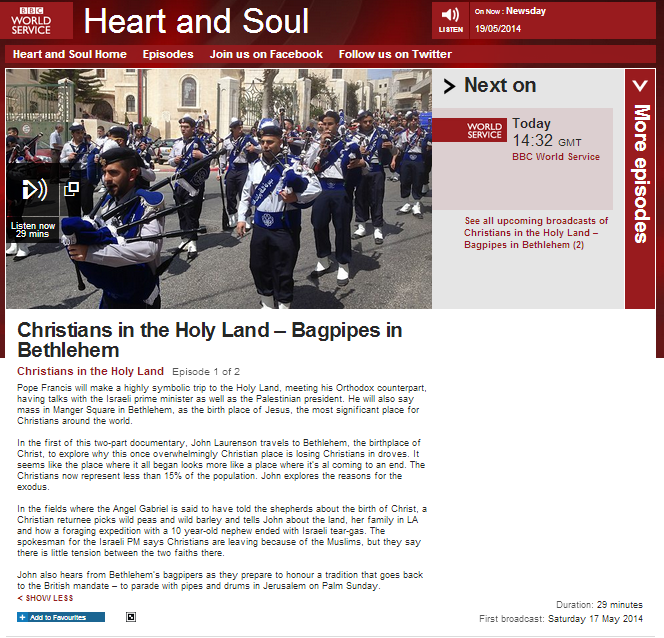
The reader who kindly wrote in to tell us about this broadcast described it as “one of the most blatantly anti-Israeli programs I’ve ever heard” and listeners will find it hard to disagree with that assessment.
Using the Pope’s upcoming visit to the Middle East as a hook, presenter John Laurenson ostensibly sets out to discover why Christians are leaving areas controlled by the Palestinian Authority, but fails completely in that mission. Had Laurenson really wanted to enlighten and inform BBC audiences with the answer to that very serious question, then he would have had to avoid the usual trap of basing most of his programme on interviews with political activists whom – in all too regular contradiction of BBC editorial guidelines – he fails to identify as such.
Laurenson’s first interviewee is Vivien Sansour, whom readers may remember from another BBC item from 2012. Sansour is an advocate of “agriculture as a form of resistance” and so it was neither surprising to find Laurenson interviewing her in a field nor to find Sansour excusing terrorism. Note Laurenson’s inadequate introduction of Sansour and his failure to make any attempt to clarify her political activities for listeners.
John Laurenson: “I’ve come up to Shepherds’ Fields. It’s a wide green valley close to Bethlehem. It was here that the angel Gabriel is believed to have told shepherds that the Christ had been born. And I’m here with Bethlehem Christian Viviene Sansour. Vivien; many Palestinian Christians have left, including your own family.”
Vivien Sansour: “Yes; my own parents left in 2001. Ah…they left because….ah…my town was under shelling and our house was [inaudible] hit and they were actually in the area where there was lots of F16s flying above their heads and so they left and came to the United States.”
Neither Sansour nor Laurenson bother to remind listeners that the PA-initiated second Intifada was in full sway at the time and Laurenson fails to question Sansour’s dubious reference to F16 jets over Bethlehem during that period.
JL: “You yourself left, but you came back. You were living in LA.”
VS: “Yes I left. I actually lived in the US for 14 years but I returned four years ago in an attempt to kind of reconnect to my heritage and reconnect to what I think is a very important struggle.”
JL: “And when you were small you’d come out onto these hills and you’d go foraging here.”
VS: “Yes, it’s a big part of our relationship with the land here and so, for example, if you leave me here in this mountain for many days I probably will survive just fine, especially in Spring.”
After having marveled over some edible plants, Laurenson provides Sansour with her next opening:
“You obviously love this place; would you consider settling down here, having children here?”
VS: “Well clearly I worry for example that my children won’t have the same childhood I had. You know, I for example took my young nephew foraging last year. And we went foraging for..ahm…a kind of thorn that we cook – it’s called akoub – and while we were foraging the soldiers started shooting tear gas at nearby village and we got the wind of the tear gas and my nephew – he’s ten years old – he didn’t know what was happening to him. His body started itching. He was crying and I felt helpless; what can I do to keep him safe? I was telling him you know everything’s gonna be fine, but I really didn’t know if everything was gonna be fine and I didn’t know where to take him. Should we go left or right? So many also traditions that I grew up with. For example now it’s Easter time. I want to go to Jerusalem on Palm Sunday. You will be able to go and I won’t be able to go and it’s a tradition.”
Attempting to provide no context for listeners as to why the soldiers in Sansour’s anecdote might have had to fire tear gas “at a nearby village” – for example a reference to the weekly violent Palestinian demonstrations at Bil’in and Na’alin – Laurenson ostensibly presents the other side of the story, but in fact merely provides Sansour with an opportunity to continue her politically motivated propaganda, throwing in some geographical revisionism to boot.
JL: “I thought there were permits for the Christians in Palestine to go to Jerusalem for Easter.”
VS: “Not everybody gets the permit. For many years actually I didn’t get the permit. Many of my friends won’t have the permit for example, so I would have to go by myself. So taking your whole family the way you used to before is no longer an option. As you can see, we’re sitting here in this very serene area in the Shepherds’ Field and we’re surrounded by beautiful greenery and wild plants but yet right in front of us is this electric fence that goes all the way through here.”
Laurenson makes no effort to inform audiences that the anti-terrorist fence is electronically monitored – not “electric” – and neither does he bother to explain that permits for Christians to travel during Easter from the Palestinian Authority controlled areas such as Bethlehem, in Area A, are actually nowhere near as difficult to obtain as Sansour and others make out in this programme, with the obvious exception of applications which raise security issues. Audiences would undoubtedly have been much more well-informed had Laurenson asked Sansour to explain the real reason her friends “won’t have the permit”.
Next, Laurenson provides Sansour with another hook, which she uses to blatantly justify terrorism against Israeli civilians – with no interference from him and with the first of numerous appearances of Laurenson’s inaccurate use of the word “wall” to describe the anti-terrorist fence instead of ‘barrier’ as recommended by the BBC style guide.
JL: “What do you say to the Israelis when …erm…they say well look it’s just simple you know; this wall has cut terrorist attacks in Israel by 90%?”
VS: “I find it comical, to be honest.”
JL: “What, you don’t believe them?”
VS: “Ah…no. Well first of all when you talk about terrorist attacks and you really are interested in stopping terrorist attacks then the first thing you will have to consider is what am I doing that is causing a resistance? And what’s happening is that people are resisting an occupation. If you continue to oppress people they’re going to react.”
Next, Laurenson moves on to another location which features frequently in BBC reports – the Cremisan Valley. There he allows free rein to – and amplifies – the blatantly inaccurate political statements of Kairos signatory Father Ibrahim Shomali.
JL: “….Father Ibrahim Shomali celebrates mass in the open air. He’s been doing this ever since the Israelis announced they were going to build an extension of the wall here. […] If the plans go ahead – and a final decision is expected in July – a convent just down the road from here will be cut off from a school the nuns there run for 400 poor children. The famous Cremisan winery, whose profits finance the school, will also be threatened by what is, Father Shomali says, an annexation of more Palestinian land by Israel.”
Laurenson fails to inform listeners that the “final decision” to which he refers is actually an ongoing court case or that Shomali’s later claim that Palestinian Christians will “lose completely” their land if the anti-terrorist fence is constructed on the originally planned route is utterly inaccurate because the lands will remain in their possession and will be accessible via a gate. Neither has he anything to say about Shomali’s political use of the word “colonies” to describe Jerusalem neighbourhoods.
Ibrahim Shomali: “They will build the wall on this land where we are standing now taking 1,200 acres from 58 Christian families will lose completely their land. And they want to annex it to Jerusalem to do the big Jerusalem and to annex two colonies together – the Gilo and Har Gilo.”
Later, Laurenson asks Shomali:
“Do you think that this wall is the reason why so many Christians have left this land?”
IS: “Not only the wall but the Israeli occupation. Because living here means living without future. If they take also all of this land I assure you families from Beit Jala will leave because it’s the only green area that we still have with Mahrour area and they will take Mahrour too. You can’t separate Jerusalem from Bethlehem. If you separate Jerusalem from Bethlehem, Bethlehem cannot live. My brother-in-law is a guide but he’s not allowed to work in Jerusalem. All the Israeli guides are allowed to work in Bethlehem because the Palestinian Authority is giving them the opportunity. Why they do not give us permits to work in Jerusalem? They don’t want us to stay here. They want a Palestine without Christian community.”
Whilst Shomali specifically says that his tour guide relative is “not allowed to work in Jerusalem”, the inference is that he is just one example of Palestinian guides not being allowed to work there, whereas according to Shomali, “all” Israeli guides can work in Bethlehem. Neither statement is true: the fact is that more than a quarter of all licenced Palestinian tour guides do have permits to work in Jerusalem and the number of Israeli guides permitted to work in Bethlehem is subject to a quota.
Not only does Laurenson fail to challenge Somali’s downright delusional and evidence free claim that Israel wants “a Palestine without Christian community”, but he actually repeats and embroiders it with a dose of bigotry of low expectations.
“Behind Father Shomali as he holds the holy wafer aloft for communion you can see on the hill one of the Israeli settlements that now circle this town [Beit Jala]. Father Shomali tells me that Israel wants to rid the Palestinian territories of Christians so as to polarise the conflict between Jews and Muslims. And because the Muslims will resort to terrorism, losing them support in the world, this is a battle Israel will win, he says.”
Beit Jala is of course situated in Area A and it is not ‘circled’ by “Israeli settlements”. Whilst the Jerusalem neighbourhood of Gilo lies to its north and Har Gilo to its west, on the other side of the ‘circle’ to the south and east is Bethlehem.
Next, Laurenson turns his attentions to the subject of the relations between Christians and Muslims in Bethlehem, with his main named interviewee being yet another political activist whom he fails to identify as such, describing Fadi Kattan – who, inter alia, was involved in the ‘Flytilla’ publicity stunt – merely as a member of “one of the oldest Bethlehem families”.
JL: “Fadi shares his Palestinian nationality with the Muslims and he says they share the same problems: the security checkpoints for example that hinder movement inside the Palestinian territories and the wall that means that he can’t take his family to the seaside or fly abroad out of Tel Aviv airport.”
Again, Laurenson fails to put checkpoints in their proper context as counter-terrorism measures and neglects to inform listeners how many there are of them or that their number has been vastly reduced as the security situation has improved.
Laurenson goes on:
“But Bethlehem Christians tend to be better educated than the Muslims and have these big family networks abroad. That is why, he [Kattan] says, faced with Bethlehem’s 29% unemployment – on a par with the Gaza Strip – the Christians emigrate more than the Muslims. It’s not because of the Muslims.”
After Kattan’s ensuing rosy anecdotes regarding his Muslim neighbours, Laurenson’s focus turns briefly to the bagpipe players of Bethlehem (a topic also covered before by the BBC), but quickly reverts to the issue of Muslim-Christian relations.
JL: “At the Church of the Nativity […] I stood outside asking people why so many Palestinian Christians have left. Again and again I got the same answers: the wall, the occupation and the economic hardship they cause. And I asked everyone another question: is it true also that there is some mistreatment of the Christians by Muslims?”
After interviews with two unidentified people who tell him how wonderful relations between Muslims and Christians are in Bethlehem, Laurenson interviews the town’s mayor – Vera Baboun – who has also frequented the BBC in the past. Baboun’s blatant political propaganda and inaccuracies go unchallenged and of course there is no mention of the Palestinian terrorism which made construction of the anti-terrorist fence necessary.
VB: “Message of Bethlehem is a message of love and peace. In our city the lord of salvation was born. In John 10 Jesus says ‘I’m the gate. I’m the gate for all the sheep. I’m the gate of salvation’. But most ironically we’ve permitted that this same city be walled with another gate. It is not a gate of salvation but a gate of discrimination. How can that fit? The city where the lord of salvation was born is besieged by a wall, with a gate of discrimination. The in and the out. The Palestinian and the Israeli. The privileged and the under privileged. How does that come for salvation [unintelligible] place? We are one and we live the irony in that?”
Less than two minutes of Laurenson’s half-hour programme are devoted to hearing the Israeli side of the story and that portion comes next in the form of a short interview with Israeli spokesman Mark Regev who tries to explain to him why Palestinian Christians might be reluctant to speak out, but Laurenson is having none of it. He goes on to mention one conversation with a woman who did “say she was worried about the Muslims” but then goes on to say:
“And Father Jamal Khader – rector of the Latin Patriarch seminary – though a long way from agreeing with her, had this to say when I asked him whether he was concerned about the rise of political Islam.”
Jamal Khader: “No we don’t feel it in Bethlehem. Neither in Palestine in general. What we see is a slow change in the religious discourse; more exclusiveness. And here it’s not particular to Muslims. We see it sometimes on Friday prayers but we can see it on the Jewish side as well, where settlers come to confiscate our land to build settlements in the name of God, in the name of the Bible. So this is religious fundamentalism and we can also talk about Christian fundamentalism – specially in the United States where Christian Zionists who support unconditionally not only the State of Israel but the policies of the government of Israel and the wall and the…and its occupation. […]”
Had Laurenson bothered to properly introduce Jamal Khader as yet another signatory of the Kairos document and explained to listeners what that document actually is, they may have been able to put Khader’s words in their proper political context. But of course – yet again – he did not and so to BBC audiences, Khader is just a priest.
Laurenson finishes off by returning to the topic of the bagpipe-playing scouts, this time in Beit Jala, and yet again engages in some context-free promotion of the inaccurate notion of insufficient permits for Palestinian Christians to visit Jerusalem for Easter. His take-away message is this:
“Will there be bagpipes for Pope Francis when he visits Bethlehem? If so, perhaps someone will whisper in his holiness’ ear what this sound means; where this sound comes from; a music of defiance that says we, Christians of the Holy Land, are here to stay.”
Had Laurenson attempted to step outside the frame and looked up some interviewees not already on the BBC’s list of contacts and with fewer political axes to grind, his programme could have been informative and interesting, as well as more accurate and impartial.
As it is, he totally embraced the specific banal narrative promoted by politically motivated interviewees according to which Palestinian Christians only leave their homeland because of Israeli actions. In breach of BBC editorial guidelines, Laurenson did not bother to properly identify his hand-picked interviewees, he inaccurately promoted the notion of the anti-terrorist fence as a “wall” in breach of the BBC style guide on multiple occasions and he promoted inaccurate information concerning the subject of permits for Palestinian Christians to visit Jerusalem during Easter.
The issue of the plight of Palestinian Christians is not a new one on these pages. We have previously quoted here the work of Khaled Abu Toameh who has been writing about the subject for years – for example in 2007:
“A number of Christian families have finally decided to break their silence and talk openly about what they describe as Muslim persecution of the Christian minority in this city. The move comes as a result of increased attacks on Christians by Muslims over the past few months. The families said they wrote letters to Palestinian Authority Chairman Mahmoud Abbas, the Vatican, Church leaders and European governments complaining about the attacks, but their appeals have fallen on deaf ears. According to the families, many Christians have long been afraid to complain in public about the campaign of “intimidation” for fear of retaliation by their Muslim neighbors and being branded “collaborators” with Israel. But following an increase in attacks on Christian-owned property in the city over the past few months, some Christians are no longer afraid to talk about the ultra-sensitive issue. And they are talking openly about leaving the city.”
Others too have written on the topic over the years – see for example here, here and here.
John Laurenson, however, chose to do worse than fail to tell the real story of Palestinian Christians, with those few still left in the Gaza Strip not even getting a mention from him. He actually lent his journalism to the promotion and amplification of propaganda which aims to conceal the real reasons for the plight of Christians in PA controlled areas and instead uses them for the purpose of politically motivated, gratuitous Israel-bashing.
There may be many words to describe this BBC World Service programme by Laurenson, but journalism is not one of them.
Part two of Laurenson’s programme will be broadcast on May 25th.

